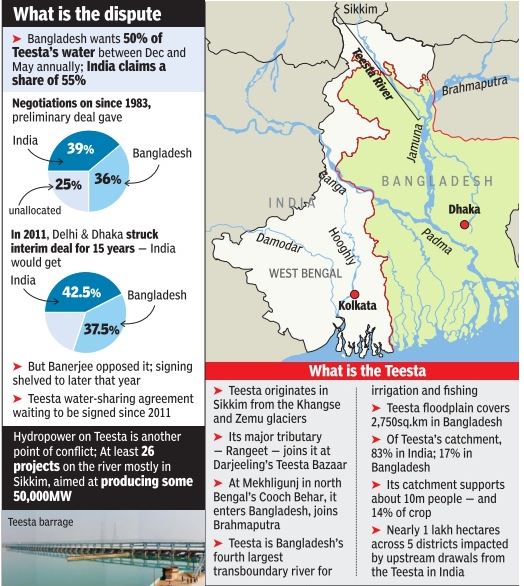Daily Hot Topic
Topic : Teesta River Dispute
GS-2 Mains : IR
Revision Notes
Context: A technical team from India will visit Bangladesh to discuss Teesta river conservation and management.

Background:
- India and Bangladesh share 54 rivers, but only two have water-sharing treaties (Ganga & Kushiyara).
- Teesta, a crucial river for both nations, remains a point of contention.
The Teesta Issue:
- Importance for India: Lifeline for several districts in North Bengal.
- Bangladesh’s Claim: Seeks “equitable” water distribution similar to the Ganga Water Treaty (1996).
- 2011 Proposed Agreement: Allocated 37.5% water to Bangladesh and 42.5% to India.
- Stalemate: West Bengal government opposed the proposal fearing harm to its agricultural interests.
Water Sharing Challenges:
- Uneven Flow: Teesta has a high flow during the wet season (June-Sept) but a scant flow during the dry season (Oct-May).
- Gazaldoba Barrage Dispute: Bangladesh claims West Bengal’s barrage diverts excessive water.
- Per Capita Water Availability: Bangladesh argues for a share despite having higher per capita water availability.
Teesta River Details:
- Tributary of Brahmaputra, originates in Sikkim, flows through West Bengal and Bangladesh.
- Fourth largest trans-boundary river for Bangladesh, crucial for its population and agriculture.
- 83% of Teesta’s catchment area lies in India.
Political Considerations:
- Bangladesh’s Concerns: Delay in Teesta agreement, dams in Sikkim, and Teesta Barrage project impacting water flow.
- China’s Proposal (2020): Major dredging work, reservoirs, and embankments on the Teesta (currently on hold).
Environmental Concerns:
- Impact of hydropower projects in Sikkim, deforestation, and climate change on Teesta’s health.
- 2023 Glacial Lake Outburst Flood: Caused destruction and loss of life in the Teesta basin.
Legal Framework:
- Helsinki Rules (1966): International law mandates sharing water from transboundary rivers.
- Indian Constitution (Article 253): Empowers the government to form transboundary water treaties.
Way Forward:
- Water sharing agreement considering both nations’ needs using modern water-use efficiency techniques.
- Addressing West Bengal’s concerns about potential irrigation loss due to the treaty.



 हिन्दी
हिन्दी